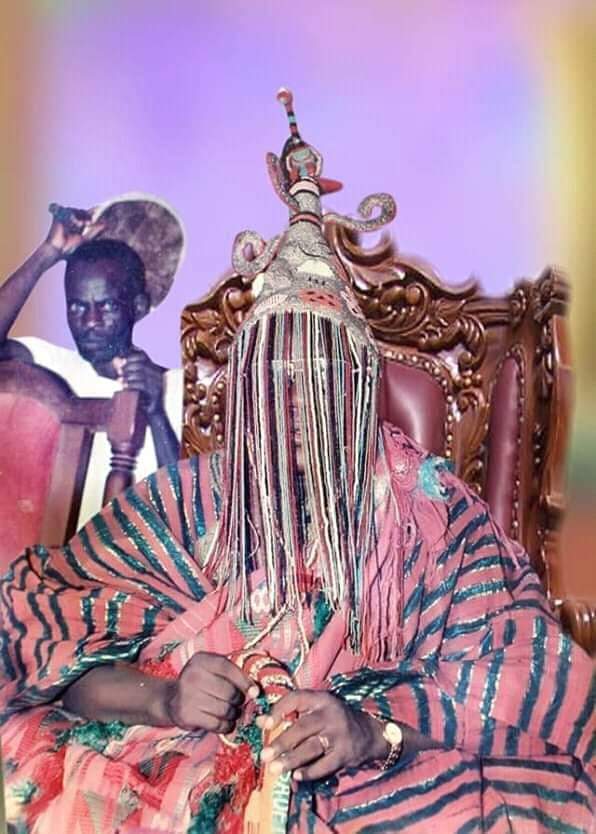“Won kere si number wa” happened to be one of the renowned anthems of the late Pa Olayiwola Fatai Olagunju popularly called Fatai Rolling Dollars in the early 2000s because it was used for an advertisement by Daily Needs Industries Limited, manufacturers of De Deon Blood Tonic. However, the proverbial vulture has been drenched by rain over the years. The real tales of the late Kokoma highlife maestro, Fatai Rolling Dollars, who passed on in June 12, 2013, has been put together by Femi Odugbemi, the top-notch cinematographer.
Fatai Rolling Dollars was a nickname that was coined around 1937, when Fatai would always roll a silver dollar piece at the coin toss in soccer matches in his school in Lagos, Nigeria. He later became one of the deep Yoruba ‘master musicians’ who introduced the guitar and other wind instruments into traditional Nigerian music. This genre of music which started out in the 1940s is a unique fusion of Caribbean influence, Yoruba traditional influence, using the native thumb piano (Agidigbo). The genre thrived along the coastal towns of West Africa at the height of the demand for independence across the continent, benefiting from the mood and aspiration for liberty.
The documentary which detailed the life of the self-eulogized “Seriki Oni Guitar” included musical tribute footages by his fellow veteran highlife musicians who told the unknown stories of Fatai Rolling Dollars which include his musical career, his rise to stardom as a young; his midlife crisis amongst many other scenarios that would challenge the current generation of practitioners.
In order to bring the documentary closer to life, there are some experiences that are very poignant to mention. Fatai grew up in a time when parents barred their children from becoming musicians but they preferred that they should take up other career path. Fatai went daringly into music by joining a popular band known as Calabar band. They were usually engaged by families and friends of people who were returning from pilgrimage in Mecca to herald their safe return at Iddo, Lagos. He developed interest in music from there and he became a performer at some pubs in Lagos.
In 1977, the tumult of life began when Fatai Rolling Dollars’ residence which was in close proximity to Kalakuta Republic of Fela Anikulapo-Kuti, engulfed in a widespread inferno as a result of the military invasion of the self-proclaimed republic. Unfortunately, Fatai Rolling Dollars lost his nascent family alongside all his musical instrument to the inferno that gulfed the entire area. This incident negatively impacted on his blossoming career.
However, the survival instinct in Fatai Rolling Dollars made him to work as a security officer for about six years where he played his instrument to keep himself engaged. As if this was not enough, other tragic incidents came calling, he was attacked by armed robbers; he was hospitalised and when he recovered, he became a church chorister so that he could earn some stipend.
It was quite intriguing to hear that the erstwhile boss of great musicians like Evangelist Ebenezer Obey, late Dr. Orlando Owoh, Bob Aladeniyi amongst others retained his true love for his craft and he was committed to his passion despite all these gloomy challenges that beclouded his life. All of these experiences reflected in his music and his optimistic view of life.
Fatai’s life went into obscurity; he resided in a small room in Mushin, a suburb of Lagos. He had the music of Lagos in his head but he was confined until in 2009 when he met Kunle Tejuosho, the in-house producer of Jazzhole Records through Duro Ikujenyo. The duo talked with him for four hours and he played some of his songs that were not recorded, he played his guitar and told many great stories. This led to the recording of his song “Won kere si number wa”.
Thereafter, fate smiled on him and his star came to full glare miraculously till he passed on. He was placed in spots at French Centre before travelling to Morocco, France, Germany, United Kingdom and other places. He equally became brand ambassadors. To cap his great life, the Lagos State Government gave him a house in one of the low cost housing estates in New Oko Oba, Lagos. The octogenarian actively collaborated with his own generation of musicians and young contemporaries like the delectable Yinka Davies, Niyi Ajileye, Aduke Aladekomo to mention a few. Till date, he holds the record of being Nigeria’s oldest practicing musician
The late Olayiwola Fatai Olagunju is a deft instrumentalist who helped the younger generation to understand the context of their music and he contributed significantly to the evolution of music in Nigeria. He is a visual history of many generations from 1953 when he started his musical career till his demise. I doff my hat for Femi Odugbemi, who did not just limited to documentary to the bloom days of the musician but gave us the deep understanding of what life entails.
Source:
Yemi Adebisi
Independent Ng


.jpeg)






0 Comments